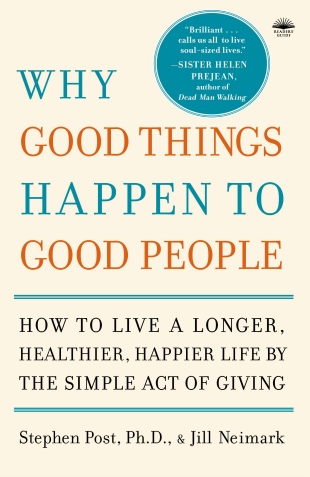"I have one simple message to offer and it's this: giving is the most potent force on the planet. Giving is the one kind of love you can count on, because you can always choose it: it's always within your power to give. Giving will protect you your whole life long." This message comes from Stephen Post, a bioethicst at Case Western Reserve University and founder of the Institute for Research on Unlimited Love. The idea for this center was suggested to him by Sir John Templeton, grantmaker and zealous advocate of the interplay between science and religion. Since 2001, Post has explored the extraordinary power of giving by funding over 50 studies at 44 major institutions. This research has focused on the traits and qualities that create happiness, health, contentment, and lasting success in life.
Why Good Things Happen to Good People looks at 10 ways of giving: celebration and gratitude, generativity (nurturing others), forgiveness, courage, humor and joy, respect, compassion, loyalty, listening, and creating. These traits or character qualities can be expressed in the following four domains: family, friends, community, and humanity. Post writes: "The remarkable bottom line of the science of love is that giving protects overall health twice as much as aspirin protects against heart disease."
Generous behavior is good medicine that benefits the giver and the recipients of our giving. Each chapter ends with 20 questions from The Love and Longevity Scale for the reader who wants to evaluate him- or herself. Then throughout the book, the author has various exercises and practices to try.
In "The Way of Celebration: Turn Gratitude into Action," Post reveals how research on giving thanks shows that it can spread to every aspect of our daily lives. Gratitude can shift the nervous system toward a calm state; it can result in surges of happiness and joy; and it can engender celebrations of all kinds, such as savoring the day, rejoicing in the lives of others, and reframing our moods.
In the chapter on "The Way of Generativity: Help Others Grow," Post defines this character trait as "selfless giving to others, in particular to future generations. [It] means nurturing others so that they are better able in turn to manifest their own gifts of love." This brand of giving brings meaning to others' lives; it inspires and supports volunteerism; it brings out the best in youth; and it brings fulfillment to the elderly who have time to be generous.
Post's "The Way of Forgiveness: Set Yourself Free" contains reports and insights from the latest research on this virtue which alleviates depression, boosts moods and reduces anger, lowers stress hormones, and preserves close relationships. There is a lot of misunderstanding about forgiveness and so the author reports on what it does not mean. Some other insights to be gleaned here are learning the limits of a grudge, seeing forgiveness as a process, and practicing the power of an apology.
According to Post, courage is the hallmark of every human who has changed the world. This character quality is explored in "The Way of Courage: Speak Up, Speak Out." The five lessons outlined in this chapter are:
1. Courage comes in many forms.
2. Learn Hardi-coping
3. En-courage others
4. Confront with care
5. Trauma can lead to transformation.
In "The Way of Humor: Connect with Joy," Post celebrates humor as a way of love that brings a lightness of being and reframes the world. In this chapter, he provides plenty of exercises to promote this quality. Here are a few of them:
1. Keep funny truisms around the house
2. Keep a joy jar at home
3. Laugh at life, but not at yourself or others.
By now, you get the point and the structure of this extraordinary paperback that offers ample insights into the power of giving when it is translated into so many different character transforming facets! You will come away from Why Good Things Happen to Good People knowing that love is alive, giving is receiving, positive emotions are lifelines, and doing good is a spur to mental health and well-being.
